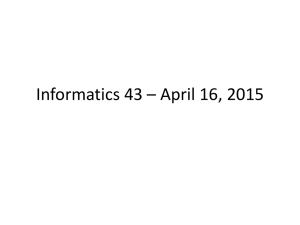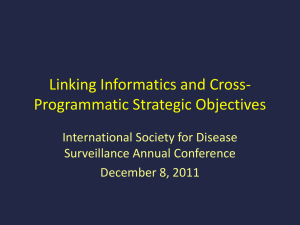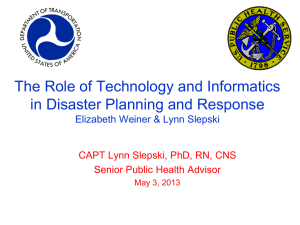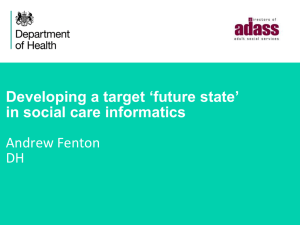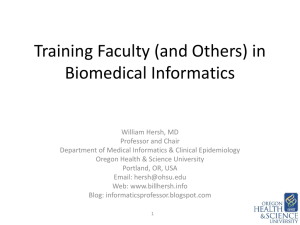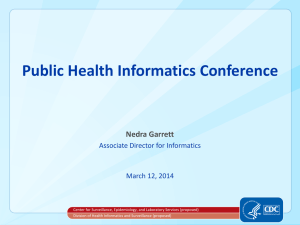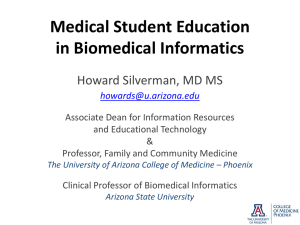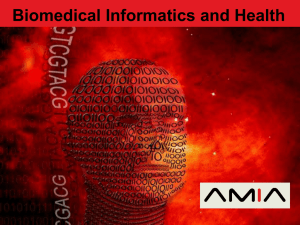health_informatics_at_unc_2012
advertisement
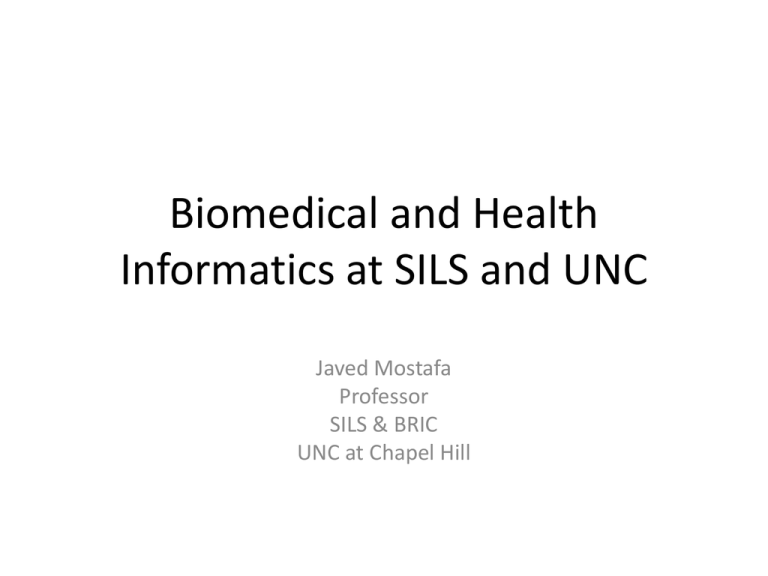
Biomedical and Health Informatics at SILS and UNC Javed Mostafa Professor SILS & BRIC UNC at Chapel Hill What is Informatics? • Informatics is the science of information, where information is defined as data with meaning. Biomedical-/Clinical-/Public Healthinformatics is the science of information applied to, or studied in the context of Biomedical-/Clinical-/Public Health. Bernstam, E., Smith, J., & Johnson, T. What is Biomedical Informatics? (2009). J. of Biomedical Informatics, 43(2010): 104-110. … Clinical Informatics • American Medical Informatics Association (AMIA) recently approved the Core Content of “subspecialty” of Clinical Informatics – Clinical Informaticians transform health care by analyzing, designing, implementing, and evaluating information and communication systems … that enhance individual, population health outcomes, improve patient care, and strengthen the clinicianpatient relationship Gardner et al. (2009). Core content for the subspecialty of clinical informatics. JAMIA, 16(2), 153-157. Tremendous Opportunity Now • Meaningful use (Blumenthal, 2010) – Improving quality, safety and efficiency – Engaging patients in their care – Increasing coordination of care – Improving the health status of the population – Ensuring privacy and security • Eligible professionals and eligible hospitals started receiving incentive payments for achieving meaningful use of EHRs in 2011 Hersh, W. (2010). Biomedical and Health Informatics: Improving Health, Healthcare, and Biomedical Research with Information Technology. Presented at the Annual CTSA Conference, Washington DC. US Funding HI Education • ONC estimates 50,000 workers needed to implement federal HIT agenda (Monegain, 2009) • ONC is funding $118 million for – Community college consortia ($70M) – Curriculum Development Centers ($10M) – Competency testing ($6M) – University training grants ($32M) • Will provide scholarship funding for graduate Hersh, W. (2010). Biomedical and Health Informatics: Improving Health, Healthcare, and Biomedical Research with Information Technology. Presented at the Annual CTSA Conference, Washington DC. The President’s Council of Advisors on Science and Technology • Information technology (IT) has the potential to transform healthcare as it has transformed many parts of our economy and society in recent decades. Properly implemented, health IT can: – Integrate technology into the flow of clinical practice as an asset, while minimizing unproductive data entry work. – Give clinicians real-time access to complete patient data, and provide them with information support to make the best decisions. – Help patients become more involved in their own care. – Enable a range of population-level public health monitoring and real-time research. – Improve clinical trials, leading to more rapid advances in personalized medicine. – Streamline processes, increase their transparency, and reduce administrative overhead, as it has in other industries. – Lead to the creation of new high-technology markets and jobs. – Help support a range of economic reforms in the healthcare system that will be needed to address our Nation’s long-term fiscal challenges. Career • Inflow may include students with biology, computer science, mathematics, IT, information science, library science, business, communication, medical, nursing, pharmacy, public health backgrounds • Job options include academia, industry, health care facilities, insurance providers, and IT companies Broad Umbrella @ UNC Biomedical/Clinical Informatics Nursing/Systems Informatics Public Health Informatics Informatics Critical Areas and Their Interactions Health Care The Health System Health Informatics Information & Communications Technology Health Care – provision of care services to an individual, group, and / or population Health system – organization, policies, quality, data management UNC Certificates • SILS – Clinical Info Sci – BS/BA with health care / technical background • SoN – Health Care Systems – Informatics – Post master’s • Gillings SPH – Public Health Informatics UNC Status I • Carolina Health Informatics Program (CHIP) – Supported through • Office of the National Coordinator / Health and Human Services • National Institutes of Health / National Center for Research Resources • Office of the Provost – UNC – CH • SILS • SoM • SoN • Gillings SPH UNC – Duke Collaboration • UNC and Duke have formed a consortium for the ONC/HHS grant – Together we received support at the level 2.1 million dollars • We started our recruitment in late summer 2010 and had interaction with about 25 students (serious prospects) – 5 recruited to the program (fall of 2010) • We are currently at 31 • UNC’s target is to recruit about 40 students by 2012 for the certificate and (eventually) degree programs Who are the competitors? • There are approximately 30-35 programs concentrating on biomedical, biological, chemical, clinical, nursing, public health informatics • The number is rapidly rising … a recent addition is UC San Diego – Division of Biomedical Informatics (summer 2009) The “Club” of 18 University of California Irvine Irvine, CA Harvard University (Medical School) Boston, MA Vanderbilt University Nashville, TN Regenstrief/Indiana University Indianapolis, IN University of Washington Seattle, WA University of Virginia Charlottesville Charlottesville, VA University of California Los Angeles Los Angeles, CA Johns Hopkins University Baltimore, MD Rice University Houston, TX University of Pittsburgh at Pittsburgh Pittsburgh, PA Oregon Health & Science University Portland, OR Columbia University Health Sciences New York, NY .Stanford University Stanford, CA University of MissouriColumbia Columbia, MO University of Utah Salt Lake City, UT University of Wisconsin Madison Madison, WI Yale University New Haven, CT University of Colorado Denver/HSC Aurora Aurora, CO Long-term Plans • Master’s program in biomedical and health informatics • We are actively seeking industrial collaborations – “Media Lab” for Health IT • We are developing grants/contracts in data management and mining, HCI, data quality, and IT spinoff potentials Questions? • Javed: jm@unc.edu • Useful links: • SILS: http://sils.unc.edu • TraCS: http://tracs.unc.edu • Others: • Office of the National Coordinator for Health IT (ONC) • – http://healthit.hhs.gov • American Medical Informatics Association (AMIA) • – http://www.amia.org • National Library of Medicine (NLM) • – http://www.nlm.nih.gov
